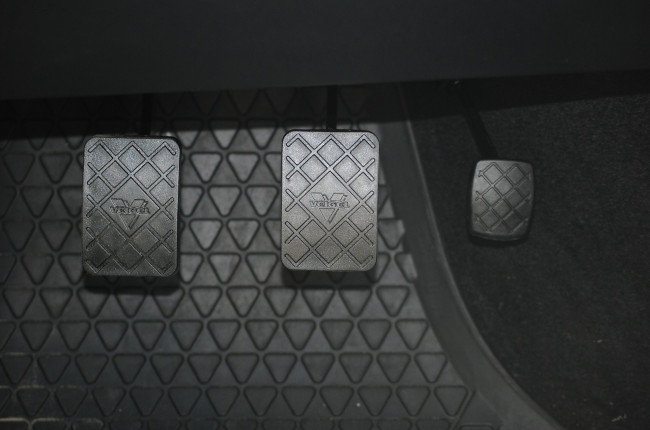
Braking systems, whether disc or drum, will need to get attention every so often and is a part of general vehicle maintenance. When that time comes, however, will depend on a lot of factors. Usually, manufacturers engineer some warnings into the design of the brake system in order to give feedback to the driver on when the brake pads or shoes need replacing. Either that, or the reduced performance is noticeable, or the service interval necessitates the change. Either way, here are a few telltale signs that you need to pay attention to your braking system.
Metallic squeaks

Depending on the type of brake pads you’re using, squeaks can be part of the experience until you put heat into the system. If you are using the stock pads, you could experience a few squeaks especially if you just started your car up. Though, if you have more performance-oriented pads, you may need to warm up the brake a bit more as they will squeak when cold.
After you’ve gotten your brakes up to normal operating temperature, if it’s still silent, then that means that the material on the pads is still thick enough. However, if you’re still hearing squeaks after a while, then that means that you should get your brakes checked, and likely the pads changed. Most pads have a backing plate with a tab that will make contact with the rotors and make a high-pitched metallic sound.
Usually, cars with high-performance brake kits like the Toyota Supra or the Nissan 370Z NISMO will be seen sporting these larger and more capable brake setups. The pads on these automobiles will be geared towards performance driving where more heat will need to be produced by the braking system. That being said, it is likely that a normal car like the Toyota Vios will not be equipped with sport pads unless you’ve bought some yourself. If you’re still running the units from the showroom or the dealership, then the sound should already be a telltale sign that it’s time for a change.
Wobbling

When you depress the brake pedal at speed, and you feel that your car wobbles noticeably, then it should be time to get – not just your pads but also your rotors resurfaced or changed. This is likely because your pads have worn through your rotors unevenly, or the pads themselves are unevenly worn.
It’s always standard practice to have the brake pads changed and the rotors resurfaced at the same time. This is to prevent things like uneven pad wear and to ensure that a nice and level surface is available for your brakes to clamp down on. You might be able to get away without resurfacing your rotors, but for added peace of mind and smoothness when you brake, this is the best practice to follow.
Deep pedal travel

Now if you need to really dig into your brakes as compared to when your car was new, then it’s probably time to get those brakes checked. If you have to really stomp on the pedal to come to a stop, you might need more than just new pads. Reduced brake performance could result in an accident. If you don't feel the bite as much as before, then be more cautious.
This could also be linked to a number of other factors, like your brake lines being worn out, air in the braking system, overheated brakes, a leak, or the brake pistons could also be seized. Whatever the case may be, as soon as you notice an anomaly such as this, make sure to take your car to a mechanic to get the problems sorted.
Though, deep pedal travel could be a trait of some high-performance pads after you’ve changed to them. If you’re just comparing apples-to-apples, meaning you’re noticing degraded performance over time with your current set, then that should be your basis. Likely a normal passenger car like the Kia Picanto will likely have shallower pedal travel as compared to more high-performance cars that have a lot of travel so you can modulate your brakes for precise input.
Rotor scarring

While the metallic part of your pads leaves a relatively smooth surface on your rotors, if you’ve worn through this material and are down to the backing plate of the pad, this can leave deeper groves in your rotors and result in damage to the system. If you go down and check your rotors and see that there are deep scratches on them, then that means that you are down to the backing plate and need to change your brake pads as soon as possible.
This is already a sign of negligence and might require you to spend on a new set of rotors depending on how deep you’ve chewed through with the backing plate of your pad.
The parking brake doesn’t engage as strong?

So for the rear parking brake to not engage, it could be because of the cable being stretched out over time, or there isn’t enough brake shoe material left to make proper contact with the drum. It could also be a seized piston once again, but in any case, it’s a sign that you shouldn’t ignore especially if your car is a manual.
Latest Features
-
An all-electric future: The Porsche Macan Electric / Featured Article
Porsche’s Macan goes all-electric; it’s a new beast with an electrified heart, yet unmistakably Porsche in performance and spirit.
-
Which Kia should I buy? / Featured Article
We’re here to help you decide which Kia vehicle is best for you, whether it’s a sedan, crossover, or minivan.
-
Why Lynk & Co is a good option for luxury car buyers / Featured Article
Lynk & Co offers premium value for those exploring the luxury market.
Popular Articles
-
Electric Vehicles in the Philippines for under P1 million
Jerome Tresvalles · Aug 19, 2025
-
Top 3 Cars For Every Lifestyle—What Cars Are Right For You? | Behind a Desk
Caco Tirona · Apr 24, 2024
-
5 Tips to Maximize Fuel Efficiency
Jerome Tresvalles · Sep 09, 2024
-
Five driving habits that are draining your fuel tank
Jerome Tresvalles · Jun 24, 2025
-
Can engine braking harm your engine?
Jerome Tresvalles · Sep 11, 2025
-
Do electric cars even need maintenance?
Jerome Tresvalles · Oct 23, 2024
-
Best vehicles for an active outdoor lifestyle
Shaynah Miranda · Jul 25, 2024
-
How to drive different types of vehicle transmissions
May 23, 2024
-
5 easy ways to keep your car interior clean
Allysa Mae Zulueta · Nov 15, 2021
-
How to survive Metro Manila traffic
Earl Lee · Aug 16, 2022




